101 Common Spanish Phrases You Need to Know
Do you want to start speaking Spanish right now? Then you need these 101 Spanish phrases.
I’ve found that the best way to learn Spanish is to speak it from day one. And the best way to start speaking is to learn Spanish phrases that you’ll use in real conversations.
Take it from me: I honestly believe it was never my destiny to speak Spanish, but I did it anyway. I started from scratch, all thanks to a complaint about a toothbrush!
But I’m getting sidetracked. Let’s get back to Spanish phrases so you too can learn to speak Spanish faster.
Table of contents
Before we get into the article, if you are interested in learning Spanish yourself, you should check out my absolute favourite resource for learning Spanish, SpanishPod101.
Every time I refresh my Spanish, this has been by far my favourite resource, since it’s a podcast style learning resource that covers many aspects of the language much better than traditional courses do.
It also tackles the issue of listening comprehension better than literally anything else out there, since its catalogue of lessons eases you in with simple lessons at first that get progressively harder, and you can listen to them for a huge range of topics better suited to your hobbies and interests.
They have a free option for anyone who wants to test them out, based on just their limited recent episodes, but exclusively for Fi3M readers, you can get 20% off if you sign-up for any of their subscriptions, which allow you to access their full catalog of many hundreds of lessons, using the code FLUENT3.
I highly recommend this to all Spanish learners!!
15 Must-Know Basic Spanish Phrases
If you’re only going to take 15 Spanish phrases away from this article, these are the must-knows!
- Hola – “Hello”
- Me llamo… – “My name is…”
- ¿Y tú? – “And you?”
- Mucho gusto – “Nice to meet you”
- ¿Qué tal? – “How are you?”
- Nos vemos – “See you”
- Por favor – “Please”
- Gracias – “Thank you”
- De nada – “You’re welcome”
- Disculpa (informal “you”) / disculpe (formal “you”) – “Excuse me”
- Me gusta / No me gusta… – “I like / I don’t like…”
- ¿Cuánto cuesta? – “How much is this?”
- ¿Dónde está el baño? – “Where’s the bathroom?”
- ¿Qué hora es? – “What time is it?”
- Me puede ayudar, por favor – “Can you help me, please?” (formal “you”)
Related learning: Do you know there are different types of “you” in Spanish? Spanish-speaking people mark the difference when the “you” is formal, informal, and plural. You can read more about this in this article.
Important Spanish Phrases to Know: The Basics
If you’re just starting out, you need to know basic Spanish greetings and introductions.
Here are a few to get started if you’re totally new to the language. Most of these are casual, so they’re best for informal situations.
Spanish Phrases for Greetings and Starting Conversations
- Hola – “Hello”
- ¿Qué tal? – “How are you?”
- ¿Qué pasa? – “What’s up?”
- ¿Cómo te va? – “How’re you doing?”
- Bien – “Good”
- Muy bien – “Very good”
- No tan bien – “Not so good”
- ¿Y tú? – “And you?”
- Me llamo… – “My name is…”
- ¿Cómo te llamas? – “What’s your name?”
- Mucho gusto – “Nice to meet you”
- Un placer – “A pleasure”
- Encantado/Encantada – “Charmed”, “Likewise”
Related learning: Hello in Spanish: “¡Hola!” and 70+ More Spanish Greetings for All Occasions
Saying Goodbye in Spanish
- Adiós – “Goodbye”
- Nos vemos – “See you”
- Nos vemos mañana – “See you tomorrow”
- Hasta luego – “See you later”
- Hasta pronto – “See you soon”
Tip: In many Spanish-speaking countries, notably in South America, it’s common to use foreign goodbyes! For example, in Argentina, Paraguay, and Uruguay, locals often say chau, from the Italian ciao.
In Puerto Rico and the Dominican Republic, it’s common to say “bye”. This is because the USA has a strong impact on the local language and culture.
Polite Phrases in Spanish
- Por favor – “Please”
- Gracias – “Thank you”
- De nada – “You’re welcome”
- No hay de qué – “No problem”
- Disculpa – “Excuse me” (informal “you”)
- Disculpe – “Excuse me” (formal “you”)
- Lo siento – “I’m sorry”
If you want to expand more on the basics, check out these really useful Spanish phrases for conversation and travel, and all the essential beginning phrases you should know.
Related learning: At Fluent in 3 Months, we’re fans of the Spanish Uncovered course. We’ve found it helps learners understand how to use the vocabulary they learn in a natural way. Give our review a read and find out if this resource can work for you!
Common Spanish Phrases for Everyday Life
The sooner you can talk about your everyday life in Spanish, the easier you’ll find it to have real Spanish conversations.
Pro tip: Everyday life is different for everyone, so pay attention to the things you do throughout the day. What did you say? What did you do? Then, make your own list of words that are relevant for you so you can learn Spanish faster.
Use these phrases as starters to get you going.
Phrases About Interests, Jobs, and Hobbies in Spanish
Getting to know others and talking about your interests are the bread and butter of learning a language. So you have to know how to express your hobbies!
- ¿Qué te gusta hacer? – “What do you like to do?”
- Mi pasatiempo favorito es… – “My favourite pastime is…”
- ¿Cuáles son tus pasatiempos? – “What are your hobbies?”
- ¿Qué haces en tu tiempo libre? – “What do you do in your free time?”
- Me gusta / No me gusta… – “I like / I don’t like…”
- Me encanta… – “I love…”
- ¿Qué te gusta leer? – “Do you like to read?”
- ¿Qué música te gusta? – “What music do you like?”
- Mi favorito es… – “My favourite is…”
- Me gusta ir… – “I like going to…”
- ¿En qué trabajas? – “What’s your job?”
- ¿Te gusta tu trabajo? – “Do you like your job?”
- Trabajo en… – “I work at…”
With these phrases, you can say things like:
- Me encanta el café. ¿Quieres ir a tomar una taza? (“I love coffee. Wanna go grab a cup?”)
- Trabajo en una escuela. Soy profesor. (“I work at a school. I’m a teacher.”)
Common Questions in Spanish
Once you know your basic Spanish question words, like qué and dónde, you can ask a whole number of things.
These are some common questions you’ll hear or need:
- ¿Cuánto cuesta? – “How much is this?”
- ¿Dónde está el baño? – “Where’s the bathroom?”
- ¿Qué hora es? – “What time is it?”
- ¿Pasa algo? – “Is something wrong?”
- ¿Sabes qué pasa? – “Do you know what’s going on?”
- ¿Es esto correcto? – “Is this right?”
- ¿Me he equivocado? – “Was I wrong?”
- ¿Me puede ayudar con esto? – “Can you help me with this?”
- ¿Puedes traerme … por favor? – “Can you bring me … please?”
- ¿Puedo entrar? – “Can I come in?”
- ¿Quieres tomar una copa? – “Want to grab a drink?
- ¿A dónde deberíamos ir a comer? – “Where should we go to eat?”
- ¿Estás listo/a? – “Are you ready?”
Exclamations, Celebrations, and Well Wishes
It’s always good to know how to wish someone well, tell them “happy birthday”, or what to say when toasting at happy hour. These are simple, single-use phrases you can learn quickly.
- ¡Cuánto tiempo sin verlo(a)! – “Long time no see!”
- ¡Feliz cumpleaños! – “Happy birthday!”
- ¡Buena suerte! – “Good luck!”
- ¡Alto! – “Stop!”
- ¡Detente (informal “you”) / ¡Deténgase! (formal “you”) – “Stop!”
- ¡Salud! – “Cheers!”
- Que te mejores (informal “you”) / Que se mejore (formal “you”) – “Get well soon”
- Buen provecho – “Bon appetit”
- Cuídate (informal “you”) / Cuídese (formal “you”) – “Take care”
- Felicitaciones – “Congratulations”
- ¡Bien hecho! – “Well done!”
- ¡Genio! – “Genius!”
- Estupendo – “Stupendous” or “Amazing”
- Genial – “Great” or “Awesome”
- ¡Increíble! – “Incredible!” or “Impressive!”
I used quite a few of these during my 2022 trip to Mexico!
Filler Words and Phrases
Smooth out your speech with conversational connectors, sentence stretchers and filler words in Spanish.
These words and phrases give you a moment to prepare what you’re going to say next. They’ll help you sound more natural and fluid, like how you speak in your native language. We use these types of sayings all the time!
- A ver… – “Let’s see…”
- Pues… – “Well…”
- Bueno… – “Well then…”
- ¿Sabes? – “You know?”
- Por supuesto – “Of course”
- Por otra parte… – “On another note…”
- Pero… – “But…”
- De verdad? – “Really?”
- Dios mío – “Oh my god”
- Entonces… – “So…”
- Así que… – “So…”
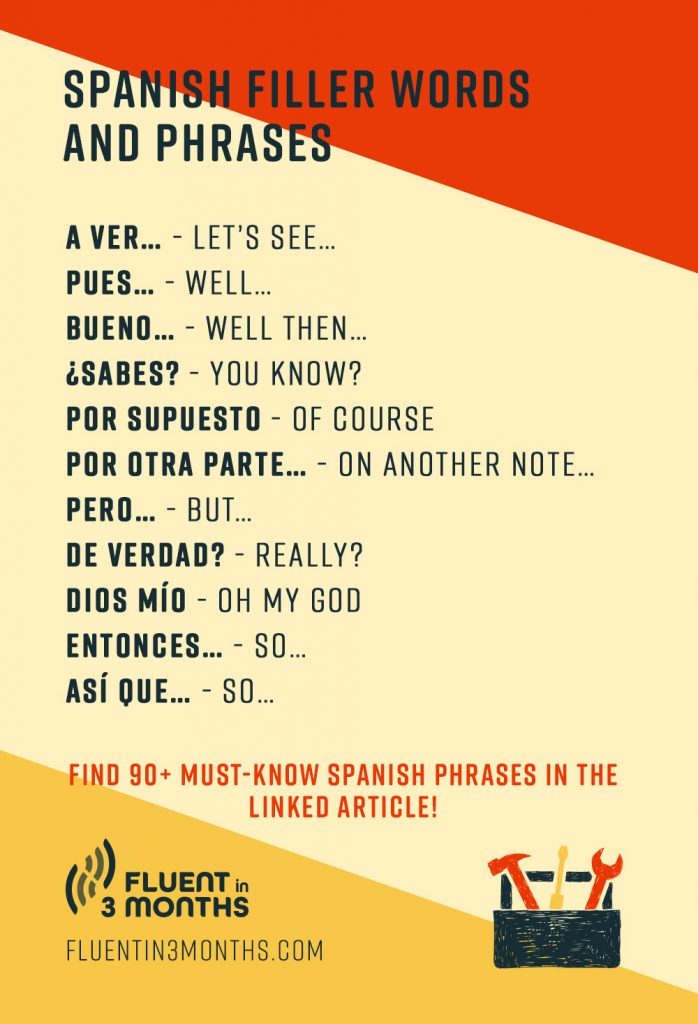
Helpful Phrases in Spanish
These are your essential phrases to fall back on when you need to express your intent, your needs, or you don’t understand.
- Necesito ayuda – “I need help”
- Llámame cuando llegues – “Call me when you arrive”
- Me voy a casa – “I’m going home”
- Necesito ir a… – “I need to go to…”
- ¿Como llego hasta ahí? – “How do I get there?”
- No lo sé – “I don´t know”
- No tengo idea – “I have no idea”
- ¿Lo entiendes? – “Do you understand?”
- No entiendo – “I don’t understand.”
- Quiero… – “I want…”
- ¿Puede hablar más despacio, por favor? – “Can you speak slowly, please?”
Funny Spanish Phrases and Sayings
Add a little colour to your conversation with funny Spanish phrases and idioms! When you can use a well-known phrase like one of these, you sound much more natural in your everyday speech.
- Ponte las pilas – “Put in your batteries”. It’s like telling someone to “look alive”, “snap out of it”, or “wake up”. You say it to a person who’s daydreaming.
- Papando moscas – “Catching flies”. Speaking of daydreaming, that’s called catching flies in Spanish. Which is quite a visual: Your friend sitting there, so completely lost in thought, the flies have started to land on him or her. But he or she doesn’t even notice!
- Comiendo moscas – “Eating flies”. Flies are popular in Spanish idioms for some reason. You use this phrase when the person talking to you is quite long-winded. It can be said about anyone who goes on tangents, or someone who can’t stay on point.
- Buena onda – “Good wave”. This means good vibes. You can also use it to describe someone who has a positive outlook and attitude.
- Me pica el bagre – “The catfish is biting me”. The catfish being your stomach, and the biting being the painful ache of hunger. In other words, “I’m starved!”
- Hablando del rey de Roma – “Speaking of the king of Rome”. It has the same meaning as “speak of the devil” in English. You say this whenever someone appears right after you were talking about them.
- Meter la pata – “To put a paw in it.” It means “to screw up”, and it’s used like how we say in English, “to put your foot in your mouth”.
- Creerse la última coca-cola del desierto – “To think of yourself as the last Coca-Cola in the desert”. This is an interesting one to me. It means you think you’re better than everyone else, or you think you’re hot stuff.
- Tener la cola sucia – “To have a dirty tail.” It comes from the idea of being sneaky like a fox. Doing something you know is wrong, but doing it anyway and trying to get away with it.
- Se puso hasta las chanclas – “Puts on his flip-flops”. It’s like the saying “He/She put on his/her beer goggles.” He or she got hammered, too drunk, trashed.
- Échale ganas – “Insert desire”. It means to try your best. “How bad do you want it?”
- Mandar a alguien por un tubo – “Send someone through a tube”. You use this to tell someone to “shove it”.
- Mala leche – “Bad milk”. You can say this about someone who has bad intentions.
- Tirar la casa por la ventana – “Throw the house out the window”. Or as you would hear Donna from Parks & Rec say, “Treat yo’ self”. It means to splurge, spend a lot of money, or otherwise go all out for a special occasion.
If this is your kind of thing, you can also check out these classic Spanish puns and Spanish jokes that are so bad they’re amazing.
¡Felicitaciones! You’re Off to a Good Start!
Well done! That was a lot to go through, but you made it. I hope you learned some helpful phrases to start speaking with others in Spanish.
If you need some motivation, check out this episode of the Language Hacking Podcast in which guest Ashton tells us about her journey from Spanish B1 to C1 in 48 days!
If she could achieve great results, so can you! Keep practising, and ¡buena suerte!
Share your progress with me on Instagram (@irishpolyglot), TikTok (@irishpolyglot), and Twitter (@irishpolyglot). If you have any questions, ask away, or just let me know what new phrases you discover.
In the meantime, have a look at these other Fi3M articles about learning Spanish:

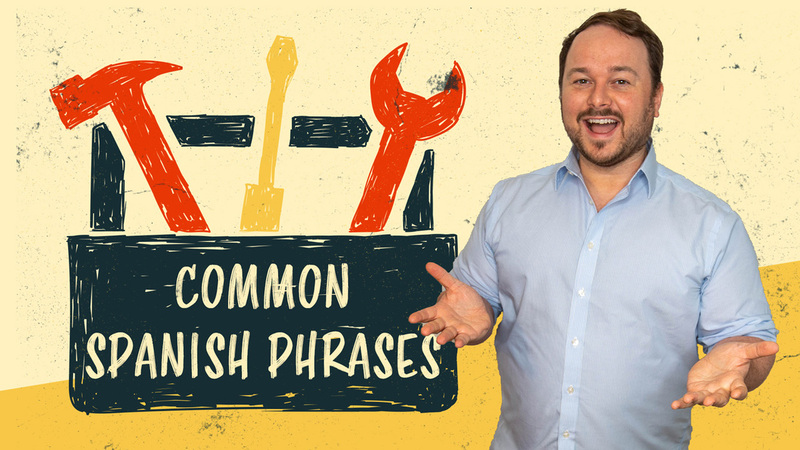
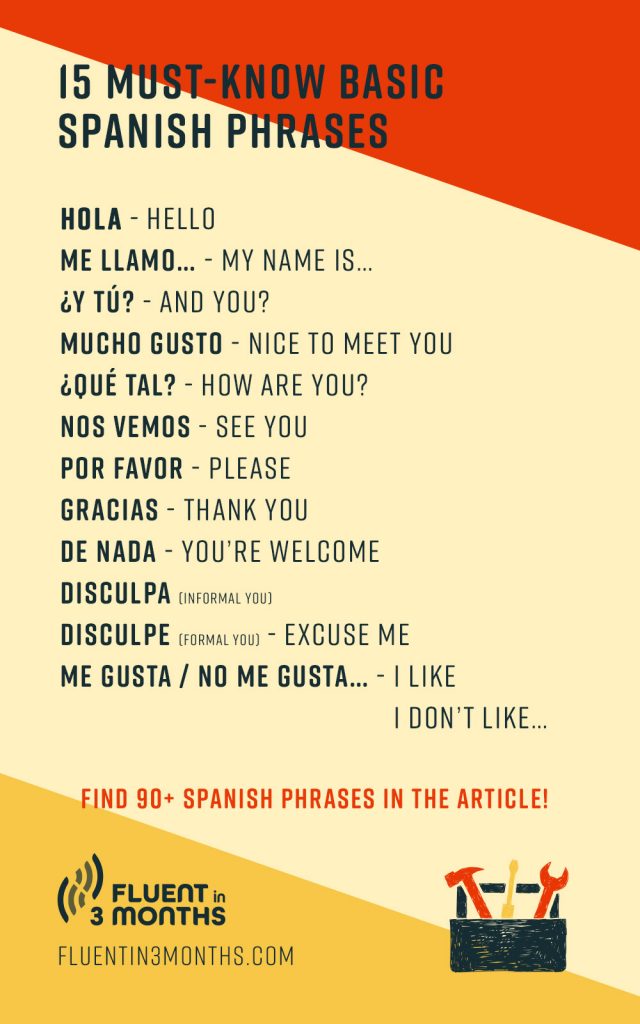
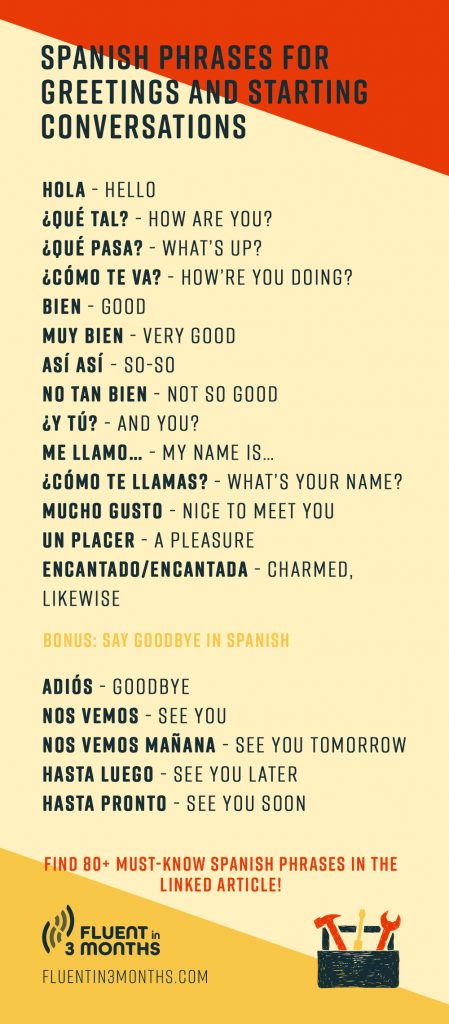
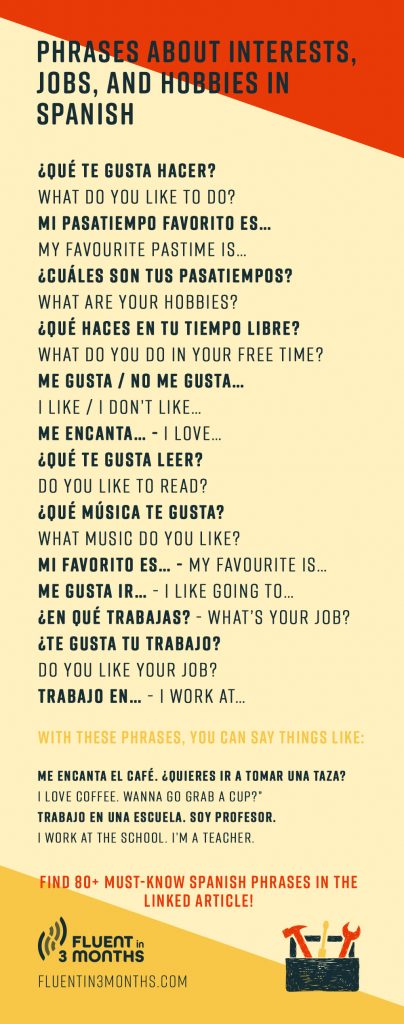
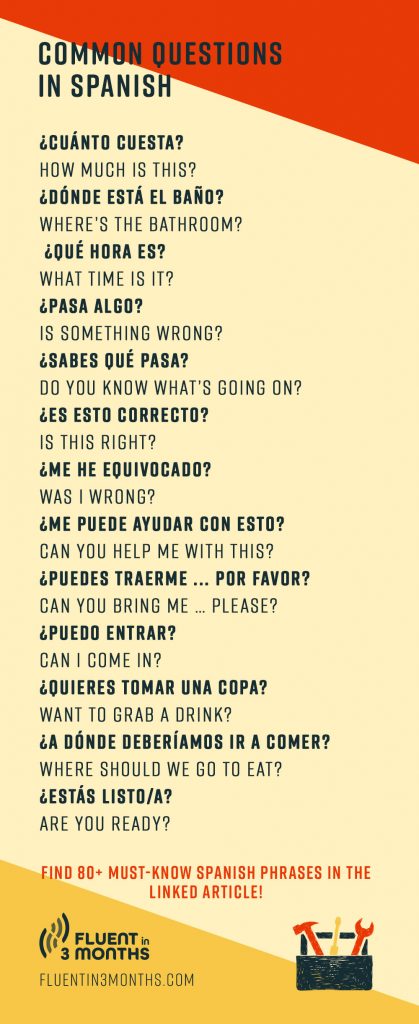

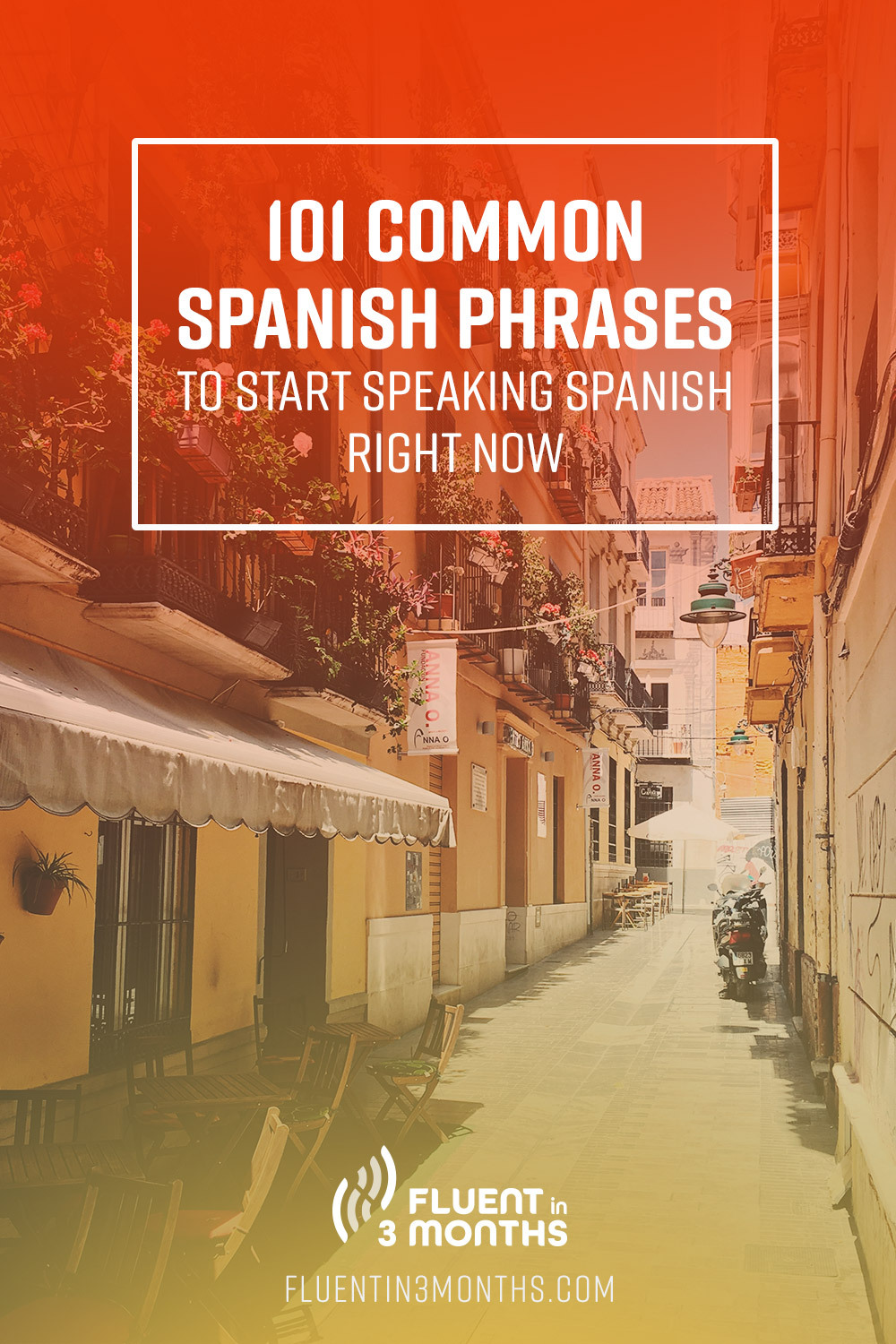

Social